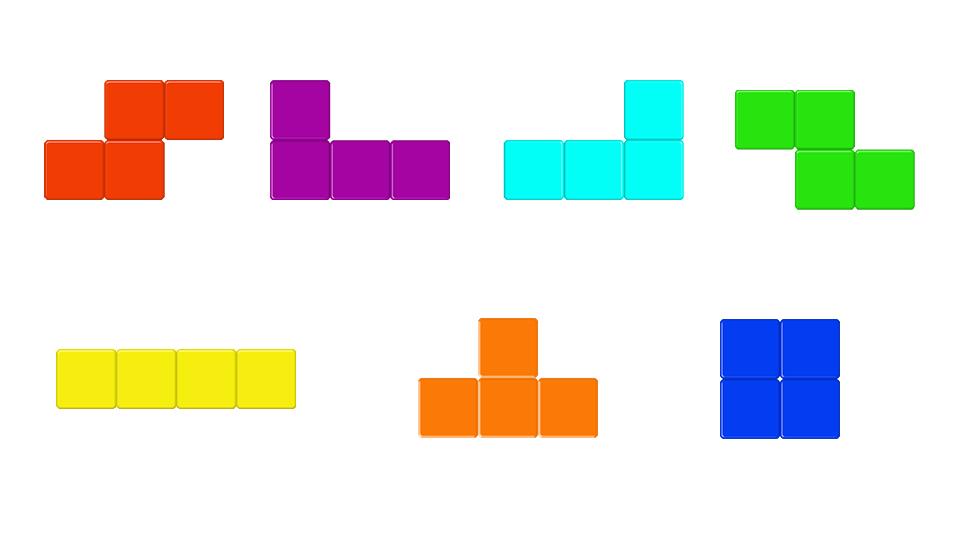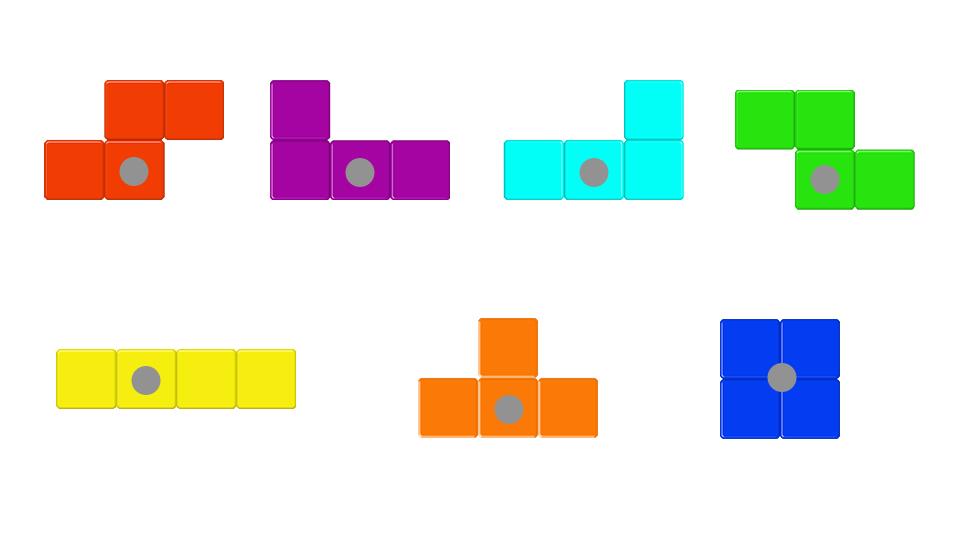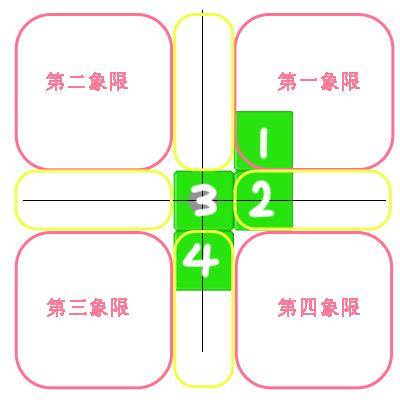CocosCreator经验总结——Typescript实现俄罗斯方块
Posted 惺惺VanXx
tags:
篇首语:本文由小常识网(cha138.com)小编为大家整理,主要介绍了CocosCreator经验总结——Typescript实现俄罗斯方块相关的知识,希望对你有一定的参考价值。
目录
1.引言
最近开始学cocos,学完Typescript语法之后,跑去看cocos的官方文档,捣鼓了几天,写了一个非常简单的贪吃蛇,甚至连像样的碰撞检测也没有,自觉无趣,就荒废了一段时间。这几个星期我又重拾了cocos,就有了实现俄罗斯方块的想法。一开始我想着上网找找资料,发现关于cocos开发俄罗斯方块的文章几乎寥寥无几(也有可能是我找的方法不对),更头痛的是,我找到的仅有几个分享文章的代码注释比较少,也可能是我的理解能力不行,后来花了几天也没能完全看懂。所以我打算自己尝试写写看,过了两个星期,总算是完成了。
在文章的后面,我会附上整个cocos的项目文件供大家参考,代码写得不好,请大家多多指教。


2.需要解决的几个关键问题
1.游戏区的方块我们怎么存储起来
因为俄罗斯方块是像素游戏,我们可以把每一个方块看成一个像素,那么整个游戏区就是一块像素集合,结合到cocos内,我们把每一个方块定义成cc.Node型,那么我们的游戏区就可以使用一个cc.Node型的二维数组将方块保存起来,方便进行旋转,位移,堆叠,删除等关键操作。在这里我使用的是一个20*10的二维数组。
//整个游戏区的格子用二维数组保存
box: cc.Node[][] = [];//初始化box二维数组,这个数组的[0][0]在游戏区的最左下角
InitBox()
for (let i = 0; i < 20; i++)
this.box[i] = [];
for (let j = 0; j < 10; j++)
this.box[i][j] = null;
//生成不同的方块集合
this.buildBlock();
2.每种类型方块集合的构建
总所周知(),俄罗斯方块中的方块有七种,分别是:反Z型、L型、反L型、Z型、条型、T型、方形。

我们可以发现,每种方块集合都是由四个小方块组成的,我们可以利用这个特点构建统一的构建方法。
为了后续使用起来方便,我首先定义了每种小方块的预制体(Prefab)和一个空节点的预制体,这个预制体所生成的节点是用来装后续构建的方块节点的。所以结构上是父与子的关系。
//正方形的子块
@property(cc.Prefab)
block_0: cc.Prefab = null;
//Z字型的子块
@property(cc.Prefab)
block_1: cc.Prefab = null;
//左L型的子块
@property(cc.Prefab)
block_2: cc.Prefab = null;
//右L型的子块
@property(cc.Prefab)
block_3: cc.Prefab = null;
//反Z型的子块
@property(cc.Prefab)
block_4: cc.Prefab = null;
//长条型的子块
@property(cc.Prefab)
block_5: cc.Prefab = null;
//T字型的子块
@property(cc.Prefab)
block_6: cc.Prefab = null;
//方块集合的中心
@property(cc.Prefab)
currentBlockCentre = null;
//当前的块
currentBlock: cc.Node = null; //currentBlockCentre的具体实现
currentBlockPart01: cc.Node = null; //四个子块的具体实现
currentBlockPart02: cc.Node = null;
currentBlockPart03: cc.Node = null;
currentBlockPart04: cc.Node = null;关于随机生成哪种颜色、哪种类型的方块,我只是简单的选择了自带的Math.random()。
buildBlock()
this.rand = Math.floor(7 * Math.random()); //从七种中随机选择一种构建
this.chooseColor(this.rand);
this.chooseType(this.rand);
后面就是根据输入的rand参数来选择构建方块集合的颜色、种类。关于如何构建,具体就是选择这个方块集合的中心点——最好选择在某个子块的中心,并将position设为(0, 0)。这样,在后续的旋转方面的实现会非常方便。然后选择好中心点之后,其他的子块就根据这个中心点来设置position,而cocos中子节点的position是相对于父节点的,子节点如果将position设置为(0, 0),那么子节点的位置就在父节点中心点上。
另外,每个子块的预制体尺寸都是60*60,也就是说游戏区每个格子之间的间隔是60。
这一段的代码比较长,我就不详细给出了。
//选择方块集合的颜色
chooseColor(rand)
……
//Z字形方块的颜色
if (rand == 1)
this.currentBlockPart01 = cc.instantiate(this.block_1);
this.currentBlockPart02 = cc.instantiate(this.block_1);
this.currentBlockPart03 = cc.instantiate(this.block_1);
this.currentBlockPart04 = cc.instantiate(this.block_1);
this.currentBlock = cc.instantiate(this.currentBlockCentre);
this.node.addChild(this.currentBlock);
this.currentBlock.setPosition(30, 510); //将当前生成的方块集合位置设定在游戏区的上面,准备后续的下落
//左L型方块的颜色
if (rand == 2)
……
//选择形状
chooseType(rand)
……
//创建Z字形
if (rand == 1)
//Z字形左
this.currentBlockPart01.setPosition(-60, 0);
this.currentBlockPart01Pos = cc.v2(18, 4); //初始化当前块的位置,相对于currentBlock
//Z字形中
this.currentBlockPart02.setPosition(0, 0);
this.currentBlockPart02Pos = cc.v2(18, 5);
//Z字形下
this.currentBlockPart03.setPosition(0, -60);
this.currentBlockPart03Pos = cc.v2(17, 5);
//Z字形右
this.currentBlockPart04.setPosition(60, -60);
this.currentBlockPart04Pos = cc.v2(17, 6);
//创建左L型
if (rand == 2)
……
3.如何将创建的方块集合和节点二维数组结合起来
上面的代码里有这样的变量:currentBlockPart0XPos,定义了当前可操作方块集合currentBlock每个子块currentBlockPart0X在box节点二维数组中的具体位置。这四个变量非常有用,之后就可以实现当前可操作方块移动之后,将位置信息保存在box节点二维数组中。
//当前子块的位置
currentBlockPart01Pos: cc.Vec2 = null;
currentBlockPart02Pos: cc.Vec2 = null;
currentBlockPart03Pos: cc.Vec2 = null;
currentBlockPart04Pos: cc.Vec2 = null;之后在每次可操作方块集合变化后,我们都可以调用下面这两个方法更新可操作方块集合在box数组中的位置。
//读取当前操作方块集合的位置信息
checkCurrentBlockPos()
this.box[this.currentBlockPart01Pos.x][this.currentBlockPart01Pos.y] = this.currentBlockPart01;
this.box[this.currentBlockPart02Pos.x][this.currentBlockPart02Pos.y] = this.currentBlockPart02;
this.box[this.currentBlockPart03Pos.x][this.currentBlockPart03Pos.y] = this.currentBlockPart03;
this.box[this.currentBlockPart04Pos.x][this.currentBlockPart04Pos.y] = this.currentBlockPart04;
//清除上个位置的当前操作方块集合位置信息
deleteCurrentBlockPos()
this.box[this.currentBlockPart01Pos.x][this.currentBlockPart01Pos.y] = null;
this.box[this.currentBlockPart02Pos.x][this.currentBlockPart02Pos.y] = null;
this.box[this.currentBlockPart03Pos.x][this.currentBlockPart03Pos.y] = null;
this.box[this.currentBlockPart04Pos.x][this.currentBlockPart04Pos.y] = null;
4.方块集合的移动和旋转
关于移动,遵循大部分俄罗斯方块游戏的操作方式,左键左移,右键右移,上键旋转,下键下移,还有自动下落。
//自动下落
autoDown()
this.schedule(() =>
//一直下落直到碰到下边界
if (this.isClashBottom())
this.deleteRow(); //行消除检测
this.buildBlock(); //创建新的方块集合
else if (this.isClashBlockDown()) //一直下落直到碰到其他方块
this.isGameOver(); //判断游戏是否结束
this.deleteRow();
this.buildBlock();
else
//向下一格
this.currentBlock.y -= 60;
this.deleteCurrentBlockPos();
this.currentBlockPart01Pos.x -= 1;
this.currentBlockPart02Pos.x -= 1;
this.currentBlockPart03Pos.x -= 1;
this.currentBlockPart04Pos.x -= 1;
this.checkCurrentBlockPos();
, 1);
//键盘监听
onKeyDown(e)
switch (e.keyCode)
case cc.macro.KEY.left:
if (this.isClashLeft()) //判断是否撞到左边界
break;
else if (this.isClashBlockLeft()) //判断当前操作块是否左边撞到了其他子块
break;
else
this.currentBlock.x -= 60;
this.deleteCurrentBlockPos();
this.currentBlockPart01Pos.y -= 1;
this.currentBlockPart02Pos.y -= 1;
this.currentBlockPart03Pos.y -= 1;
this.currentBlockPart04Pos.y -= 1;
this.checkCurrentBlockPos();
break;
case cc.macro.KEY.right:
……
case cc.macro.KEY.up:
//改变形态
if (this.isClashLeft()) //判断是否撞到左边界
break;
else if (this.isClashRight()) //判断是否撞到右边界
break;
else if (this.isClashBottom()) //判断是否撞到下边界
break;
else if (this.isClashBlockLeft()) //判断当前操作块是否左边撞到了其他子块
break;
else if (this.isClashBlockRight()) //判断当前操作块是否右边边撞到了其他子块
break;
else if (this.isClashBlockDown()) //判断当前操作块是否下边撞到了其他子块
break;
else
this.deleteCurrentBlockPos();
this.changeShape(); //旋转变形态
this.checkCurrentBlockPos();
break;
case cc.macro.KEY.down:
……
关于旋转这部分,我其实是取巧了,我特意设置了某些子块的位置为中心点,正好可以使我这种旋转操作成立。
图中灰色圆形指出的子块则是我设定的中心点。而如果将中心点作为二维坐标原点,可以划分为八个区域:y轴上半、y轴下半、x轴左半、x轴右半、第一象限、第二象限、第三象限、第四象限。



以Z型旋转为例,可以发现,在四个坐标轴上的子块x和y都改变了,而在象限上的子块只是改变了x和y的其中一个,而且是取原来值的相反数。我们这样实现旋转,实际上只是子块的位置改变了,子块所朝方向并没有改变。
//旋转变形态
changeShape()
this.whichPartChange(this.currentBlockPart01, this.currentBlockPart01Pos);
this.whichPartChange(this.currentBlockPart02, this.currentBlockPart02Pos);
this.whichPartChange(this.currentBlockPart03, this.currentBlockPart03Pos);
this.whichPartChange(this.currentBlockPart04, this.currentBlockPart04Pos);
//传入被判断的部分
whichPartChange(currentBlockPart: cc.Node, currentBlockPartPos: cc.Vec2)
//修正参数,用于旋转currentBlockPartPos的位置,从左边到上边,上边到右边,右边到下边,下边到左边,在象限中的不需要用到
let modParameterX = Math.abs(currentBlockPart.position.x / 60);
let modParameterY = Math.abs(currentBlockPart.position.y / 60);
let modParameterMax = Math.max(modParameterX, modParameterY);
//y轴上半
if (currentBlockPart.position.x == 0 && currentBlockPart.position.y > 0)
//行- 列+
currentBlockPartPos.x -= modParameterMax;
currentBlockPartPos.y += modParameterMax;
//旋转当前块的位置
currentBlockPart.setPosition(currentBlockPart.position.y, currentBlockPart.position.x);
//x轴左半
else if (currentBlockPart.position.x < 0 && currentBlockPart.position.y == 0)
……
//y轴下半
else if (currentBlockPart.position.x == 0 && currentBlockPart.position.y < 0)
……
//x轴右半
else if (currentBlockPart.position.x > 0 && currentBlockPart.position.y == 0)
……
//第一象限
if (currentBlockPart.position.x > 0 && currentBlockPart.position.y > 0)
//行-
if (currentBlockPart.position.x >= 60 && currentBlockPart.position.y >= 60)
currentBlockPartPos.x -= 2;
else
currentBlockPartPos.x -= 1;
//旋转当前块的位置
currentBlockPart.setPosition(currentBlockPart.position.x, -currentBlockPart.position.y);
//第二象限
else if (currentBlockPart.position.x < 0 && currentBlockPart.position.y > 0)
……
//第三象限
else if (currentBlockPart.position.x < 0 && currentBlockPart.position.y < 0)
……
//第四象限
else if (currentBlockPart.position.x > 0 && currentBlockPart.position.y < 0)
……
5.边界和方块检测
边界检测有三种,分别是左边界检测、右边界检测和下边界检测。方块检测同样为三种,分别是当前可操作方块集合下方检测、左方检测和右方检测。
//判断是否即将碰撞到左边界
isClashLeft(): boolean
if (this.currentBlockPart01Pos.y - 1 < 0 || this.currentBlockPart02Pos.y - 1 < 0 ||
this.currentBlockPart03Pos.y - 1 < 0 || this.currentBlockPart04Pos.y - 1 < 0)
return true;
return false;
//判断是否即将碰撞到右边界
isClashRight(): boolean
……
//判断是否即将碰撞到下边界
isClashBottom(): boolean
……
//判断是否即将碰撞到其他方块(下)
isClashBlockDown(): boolean
//向下检测方块碰撞
if (this.box[this.currentBlockPart01Pos.x - 1][this.currentBlockPart01Pos.y] != null && !this.isCurrentBlockChild(this.box[this.currentBlockPart01Pos.x - 1][this.currentBlockPart01Pos.y]) ||
this.box[this.currentBlockPart02Pos.x - 1][this.currentBlockPart02Pos.y] != null && !this.isCurrentBlockChild(this.box[this.currentBlockPart02Pos.x - 1][this.currentBlockPart02Pos.y]) ||
this.box[this.currentBlockPart03Pos.x - 1][this.currentBlockPart03Pos.y] != null && !this.isCurrentBlockChild(this.box[this.currentBlockPart03Pos.x - 1][this.currentBlockPart03Pos.y]) ||
this.box[this.currentBlockPart04Pos.x - 1][this.currentBlockPart04Pos.y] != null && !this.isCurrentBlockChild(this.box[this.currentBlockPart04Pos.x - 1][this.currentBlockPart04Pos.y]))
return true;
//判断是否即将碰撞到其他方块(左)
isClashBlockLeft()
……
//判断是否即将碰撞到其他方块(右)
isClashBlockRight()
……
//判断是否是当前操作方块集合的子块
isCurrentBlockChild(judgeObj: cc.Node): boolean
for (let i = 0; i < 4; i++)
if (judgeObj === this.currentBlock.children[i])
return true;
return false;
因为每个子块在对方块检测时,都要向左、右或下一格判断是否存在其他方块,而有可能判断的方块是和自己同一个父类的,所以判断时还要判断是否为当前操作方块集合的子块。
6.方块的整行消除
需要注意的是,游戏内方块如果一列一列看的话,有时会存在镂空的情况,这时就要考虑镂空的时候要怎么向下移动一格。所以在rowDown()方法中,在整体下降的时候,如果判断到同一列上一格是空的,则赋为null,把刚移动到下一格的方块信息删除。
//行消除检测
deleteRow()
for (let i = 0; i < 18; i++)
let count = 0;
for (let j = 0; j < 10; j++)
if (this.box[i][j] != null)
count++;
//如果某一行内都存在方块
if (count == 10)
for (let j = 0; j < 10; j++)
//方块删除
this.box[i][j].removeFromParent();
this.box[i][j] = null;
this.rowDown(i);
i--; //因为rowDown(i)后,整体向下了一格,所以i--,否则无法实现多行消除,导致游戏无法正常运行
//全体方块向下移动一格
rowDown(i: number)
//记录i值,即被当前被消除行
let k = i;
//列遍历
for (let j = 0; j < 10; j++)
//temp:用于计算当前被消除行上面有多少行的方块元素(包括中间层存在镂空)
let temp = -1;
for (i = k; i < 18; i++)
temp++;
if (this.box[i][j] != null)
this.box[i - 1][j] = this.box[i][j];
this.box[i][j].y -= 60;
if (this.box[i + 1][j] == null)
this.box[temp + k][j] = null;
3.写在最后
大体上最核心的问题我应该都好好说明了,如果有某些地方不清楚的话,欢迎下载原项目文件:
链接: 百度网盘 请输入提取码 提取码: c4ss
非常感谢以下两位大佬提供了部分思路和素材:
以上是关于CocosCreator经验总结——Typescript实现俄罗斯方块的主要内容,如果未能解决你的问题,请参考以下文章